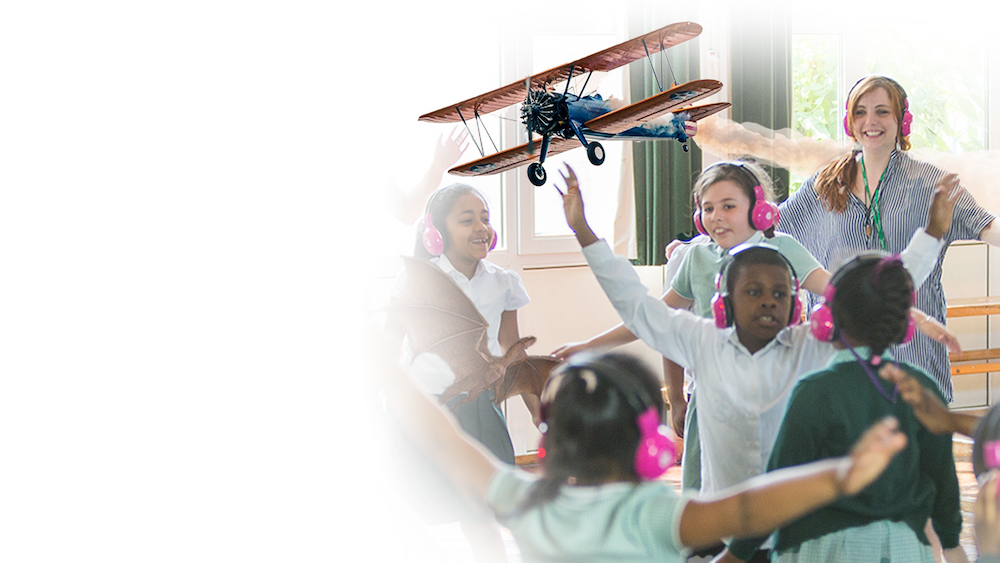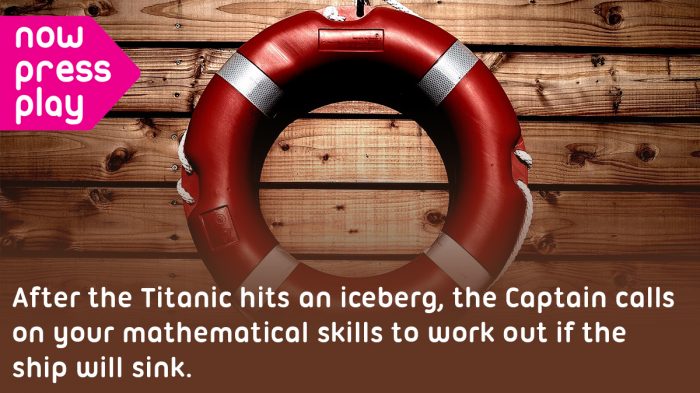
15th April sees the anniversary of the sinking of the Titanic, over 100 years ago. For KS2 teachers, now>press>play offers an immersive learning Experience that can help you embed Titanic Remembrance Day into your curriculum planning.
The story of the Titanic disaster
At 11.40pm on the night of 14th April 1912, en route to New York and on her maiden voyage, the RMS Titanic struck the iceberg that would ultimately lead to her sinking less than three hours later. Out of over 2,200 people on board, approximately 700 lived to tell the tale.
If you want to know how it might have felt to have been on the Titanic, here are just a few of the survivor’s stories:
Laura Mabel Francatelli
Laura Mabel Francatelli, a 30-year-old secretary from London, reflected on the dramatic arrival of the rescue ship Carpathia: “Oh at daybreak, when we saw the lights of that ship, about 4 miles away, we rowed like mad, & passed icebergs like mountains, at last about 6:30 the dear Carpathia picked us up, our little boat was like a speck against that giant. Then came my weakest moment, they lowered a rope swing, which was awkward to sit on, with my life preserver ’round me. Then they hauled me up, by the side of the boat. Can you imagine, swinging in the air over the sea, I just shut my eyes & clung tight saying ‘Am I safe,?’ at last I felt a strong arm pulling me onto the boat…”
Chas Burgess
Mr Chas Burgess, second class baker of the Titanic recalled that: “We had just had supper when we felt a slight shock, we took no further notice and went on working. The bread was due out of the oven then and we got it out, and I then prepared the oven for the scones. I proceeded to put the butter in to melt for the corn bread which the American passengers are fond of. No sooner had I done this when the order came, ‘All hands on deck; bring your lifebelts.’ I was proceeding up to the boat deck when I remembered the butter, and, thinking it might melt too much and catch alight, I returned and took it out, placing it on a cold stove.”
Jack Thayer
It was the desperate cries for help that haunted John “Jack” Thayer. The shouts from those thrown into the icy water swelled into “one long continuous wailing chant,” noted the teenager. “It sounded like locusts on a midsummer night in the woods. This terrible cry lasted for twenty or thirty minutes, gradually dying away, as one after another could no longer withstand the cold and exposure.”
Exploring the Titanic with now>press>play’s maths Experience
Our Fractions Experience takes place aboard the Titanic and brings the disaster to life. Use our Fractions Experience as a point of historical inquiry, inspire literacy, or as a creative way to practice fractions in context.
In this Experience, your class will use maths to work out which deck they should hide on as a stowaway, if there are enough lifeboats and how many people can fit in each lifeboat and the numbers of victims and survivors.
Using the Titanic Fractions Experience: Chisenhale Primary School
Allen Gross, a year 6 Teacher at Chisenhale Primary, told us that, for his class, being in the Fractions Experience aboard the Titanic “really helped them to understand. I was then able to build on this back in the classroom and what’s more, the entire class were having fun doing fractions.”
A year 5 pupil at Chisenhale also wrote a brilliant review of our Fractions Experience for First News back in 2015:
“now>press>play is a fun and exciting way to learn. we learned so much about history and about the Titanic in maths (fractions) and also a lot about anti-bullying.
When we were starting maths, most people thought: “How can we learn about fractions while the Titanic sinks?” But it turned out that everyone enjoyed our first now>press>play Experience and became fractions experts! We learned so much just by listening to great stories on headsets and moving around according to what the headsets told us to do.
We moved around in a wide-open space like the hall and used north, east, west and south posters to guide us in whichever direction we had to go. We could visit places without leaving school, plus everyone was having fun while doing it!
Sometimes we do a bit of writing about it at the end, but no-one really minds because your brain is still thinking about the wonderful experience you just had. When we were doing the anti-bullying now>press>play we had to summarise what it was about and then explain what happened in the experience. Everyone’s mind was buzzing with imagination and, in the end, everyone had an absolutely fantastic story.
So in my opinion I think now>press>play is a great way to learn and makes everyone in Chisenhale happy.”
To find out how you can become a now>press>play school, you can get in touch via our website.
Read more:

